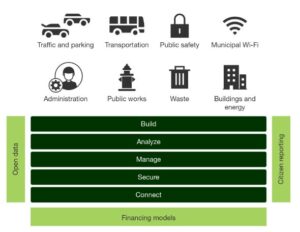Do Cities Need A “Smart City Platform”?
Do cities need a “smart city platform”? It depends. Clients have been asking Forrester about our thoughts on new IoT-enabled smart city platforms launched by vendors focused on transforming city government infrastructure and applications. To answer that question, we set out to understand when and where cities might need one, and how to decide which platform is right for them. Take a look at our new report, “Smart City Platforms Enable The Insights-Driven City.”
The bottom line: New platforms can help cities become “smart” — capturing and leveraging data to enable better decisions — but there isn’t a single path.
Cities Strive To Become Insights-Driven
We’ve heard about smart cities for years. Cities have experimented with different initiatives on their journey to becoming “smart.” But city leaders now understand that the key to becoming smart is having access to information, and to use that information to improve citizen services and city operations. Now, nearly half (47%) of local government stakeholders in 2017 recognized the importance of using data and analytics insights to drive business decision making, up from 20% in 2015. Does that translate into the need to coordinate data capture and establish the common infrastructure for the city that these new platforms provide?
New Platforms Help Cities Become “Smart”
 Smart city platforms provide a foundation for urban infrastructure, applications, and services, plus several city-specific functions. Basic IoT platforms provide a starting point for cities. Several vendors fit the bill. But to address city-specific requirements, vendors must provide or integrate open data portals and citizen engagement tools.
Smart city platforms provide a foundation for urban infrastructure, applications, and services, plus several city-specific functions. Basic IoT platforms provide a starting point for cities. Several vendors fit the bill. But to address city-specific requirements, vendors must provide or integrate open data portals and citizen engagement tools.
The platforms then must accommodate city-centric solutions to address the wide range of city challenges: waste and water management, public safety, transportation, air quality monitoring, traffic and parking, administrative services, public works, municipal Wi-Fi, and more.
There’s No Single Path To City Transformation
How a city approaches platform adoption depends on the needs of the city. Some cities focus on an application-specific approach to address a particular issue such as waste management or traffic management; others focus on deploying a multifunction platform that’s the foundation for a broad range of IoT-enabled city applications and services. With either approach, cities must be able to plug in new solutions. In a fast-moving technology landscape, cities must watch emerging industry standards and encourage vendors to do the same.
We have yet to see any city truly embrace the full platform approach. But the vision provides a destination for the smart city journey.